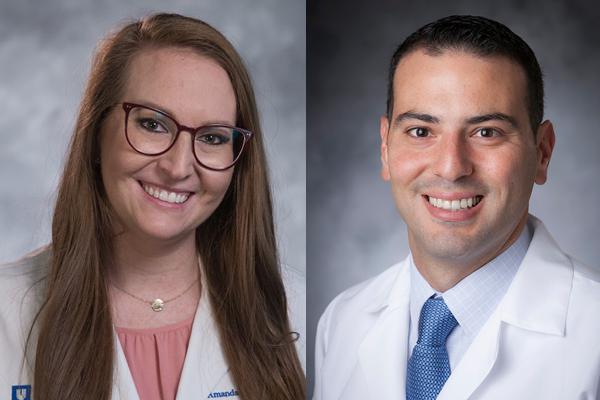Multidisciplinary Pediatric Skull Base Program Delivers Comprehensive Care for Children

Collaborating with colleagues throughout Duke Health, the Department of Head and Neck Surgery & Communication Sciences (HNS&CS) is part of a new effort to expand expert care to children and adolescents with skull base tumors.
The Duke Pediatric Skull Base Program leverages the experience and knowledge of Duke’s Adult Skull Base Tumor Program, bringing together Duke HNS&CS surgeons with Duke neurosurgeons and pediatric specialists.
Uniting Expertise Across Duke
The initiative began when pediatric neurosurgeon Amanda Jenson, MD, joined Duke in 2024. With fellowship training in Pediatric Neurosurgery and Skull Base Surgery, Dr. Jenson brought a new level of expertise to her department. As she received referrals for pediatric skull base tumor consultations, she connected with Duke HNS&CS’s Skull Base Center director Ralph Abi Hachem, MD, to take advantage of his expertise and tap into the established program’s experience as a high-volume skull base surgery center.
Dr. Jenson and Dr. Abi Hachem coordinated with their colleagues in Neurosurgery and HNS&CS, including David Jang, MD, and pediatric experts like Jeff Cheng, MD, of HNS&CS and faculty in other departments, to create a comprehensive experience for patients from birth to about 18 to 20 years old. The pediatric program includes specialists in pediatric pre- and postoperative care, pediatric intensive care, pediatric endocrinology, and pediatric ophthalmology.
“Many of the skull-base problems that affect children require lifelong care, such as hormone replacement therapy,” Dr. Jenson said. “Providing pediatric subspecialties, such as pediatric endocrinology and pediatric ophthalmology, is what makes us a complete pediatric skull base program.”
Treating a Variety of Pediatric Skull Base Conditions
The pediatric program treats patients with all kinds of congenital and acquired skull base tumors, including, but not limited to, pituitary disorders and tumors, craniopharyngiomas, cerebrospinal fluid leaks, angiofibromas, neurofibromas and neurofibromatosis type 2, sarcomas, and chordomas.
By combining skills across Duke, the Pediatric Skull Base Program can offer treatments including:
- Minimally invasive endoscopy
- Open surgery
- Stereotactic radiosurgery
- Observation
- Chemotherapy, when indicated
“We always try to offer the most minimally invasive approach first,” Dr. Abi Hachem said. “Endoscopic procedures minimize scars and offer faster recovery. The main advantage of endoscopy is that you approach the brain and the lesion directly from below, so you minimize brain retraction that is used in other approaches.”
“But if needed, Dr. Jenson is trained in open skull-base approaches. Together, we can offer children the best surgical option for their condition.”
The procedures are the same as those offered to adults, but the smaller size of a child’s anatomy creates challenges. That’s one of the reasons why incorporating pediatric specialists before and after surgery is essential.
While the pediatric program is new, the Duke team is experienced with working with children. Before the launch of the Pediatric Skull Base Program, the team typically treated 10 to 15 children a year for skull base tumors. With the new program, the team hopes to expand its ability to help more children.
“We want to take the program to the next level by having a team dedicated to this patient population,” Dr. Abi Hachem said.
A Seamless Experience for Patients
Most patients are referred to the program by their pediatrician. Dr. Jenson usually sees the patient first and brings in the appropriate subspecialists based on each child’s needs.
“Our goal is for patients to see all the subspecialists they need in a single day,” Dr. Jenson said.
To make the experience as easy as possible for patients and parents, each patient is connected to a nurse navigator who acts as the single point of contact. The nurse navigator coordinates appointments with the different specialists and can answer questions the parents and patients have.
Referring physicians can expect to receive a follow-up letter from the team explaining the treatment plan and outcome. After a procedure, the child’s care is generally transitioned back to the referring physician for continued care, with the Pediatric Skull Base team available when needed for support.
“Referring physicians aren't transferring care — we are combining our efforts to provide the child with the ultimate care,” Dr. Jenson said.
Innovating and Expanding
Both Dr. Abi Hachem and Dr. Jenson are excited about the future of the program. In addition to expanding the number of children they can help, the members of the team look forward to continuing research into pediatric skull base conditions.
“We will seek to be innovators in research and apply what we learn to our kiddos — leveraging the Duke research enterprise, collaborating with basic science and translational science researchers to advance the field,” Dr. Abi Hachem said.
While the program officially launched recently, its overall mission is clear.
“We’re building on the pediatric skull base care we’ve provided for years. We’ve refined our care pathway to is to provide safe, quality care for our pediatric patients, locally and nationally,” Dr. Abi Hachem said.
To refer a patient, call Duke's Consultation and Referral Center at 800-633-3853 or log into Duke MedLink.